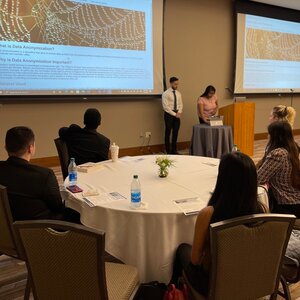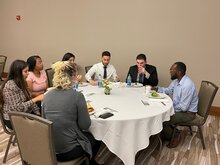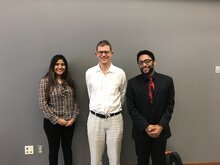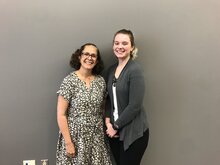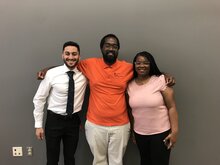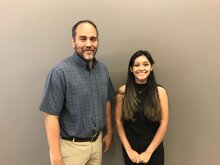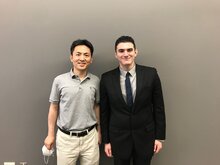The second annual Blackwell Summer Scholars program concluded on July 1, 2022, with the scholars presenting research projects they developed over the six-week workshop. Named for University of Illinois Mathematics alumnus, David H. Blackwell, the Blackwell Summer Scholars program intends to honor the legacy of the world-renowned scholar of mathematics and statistics. Created to increase access and equity for graduate degrees in statistics, data sciences, and mathematics, the 2022 Blackwell Summer Scholars program invited seven scholars to carry on his legacy during the summer workshop series.
Pairing the scholars with a faculty mentor and a research assistant, the undergraduate students began working on their projects early on in the workshop. Each scholar or group presented their projects through twenty-minute lectures and visual presentations at the I-Hotel and Conference Center. Seven scholars expertly presented five different topics ranging from rainfall estimation in tropical regions, maintaining personal privacy with database anonymization, analyzing datasets in psychometric tests, predictive modeling with Major League Baseball, and developing a series of deep learning projects. Illinois corporate affiliates DuPont and Nisa Investment Advisors graciously supported the 2022 Blackwell Summer Scholars program through generous contributions.
The seven Blackwell Scholars, six Illinois undergraduates and the seventh from Winston-Salem State University in North Carolina, began the program on May 23, 2022, with the kickoff of the second annual Blackwell Summer Scholars program. Scholars met with mentors, research assistants, program organizers, and the College of LAS Assistant Dean of Inclusive Excellence, Dr. Lloyd Munjanja, and College of LAS Dean, Dr. Venetria Patton at the welcome event. Both college leaders offered support and encouragement to the scholars as they embarked on their six-week research journey.
As the scholars developed their projects throughout the program, they attended seminar talks hosted multiple times a week. Each talk gave them further insight into research methodologies, critical thinking, seeking out mentors, job talks, graduate application processes, and several other topical talks. Speakers included current faculty, program directors, doctoral students, alumni, and emeriti, all sharing their unique perspectives and guidance.
Continue reading for further details on the scholars and their research topics. Scholars are listed in order of presentations.
Richard Sowers of Math and ISE mentored Jared Canty (Information Sciences and Brain and Cognitive Sciences) and Saumya Malhotra (Applied Mathematics) on developing deep learning projects to be applicable in a learning environment. Through this process, the scholars learned how to formulate machine-learning problems. “Machine-learning research involves so much more than just opening Kaggle, taking some data, and creating some insights out of thin air,” Canty mentioned at the start of the presentation. The duo not only increased their collaborative work experience through their work with Prof. Sowers but also gained a new appreciation for the impacts and meanings of what data science is beyond introductory levels of understanding of the science and methodologies of data science.
Lelys Bravo of Statistics mentored Holly Wingren (Astronomy and Physics) on her project that delved into areal to point rainfall estimation in tropical regions. The objective of this project was to use readily available rainfall-gridded data sets from the National Oceanic and Atmospheric Admiration (NOAA) to check their suitability for use in tropical regions. Using spatial statistics and CMAP data in R, Wingren formulated the rainfall data of Northern South America to develop predictive values in the region. Wingren mentioned after her presentation, that though the project remained incomplete, she planned to continue the work outside of the Blackwell program to further investigate methodologies to better estimate the nugget effect.
Christopher Kinson of Statistics mentored Alexis Bryant (Mathematics-Winston-Salem State University) and Vahey Mouradian (Statistics) on developing an interactive Shiny app in R to anonymize Urbana’s rental data to maintain personal privacy. Using publicly available data of various metrics of Urbana rental properties, the duo utilized anonymization methods to implement differential privacy. Through generalization, noise addition, and micro-aggregation, Bryant and Mouradian provided examples of the three main anonymization methods in real time using their Shiny app. The scholars plan to continue their research to learn more about the various methods used to obtain differential privacy.
Steven Culpepper (Statistics) mentored Jasede Masson (Psychology) on her project analyzing polytomous datasets in psychometric tests in psychology. Masson developed an interdisciplinary project by comparing different personality tests relating psychology to statistics and modeling with polytomous data sets, polychoric correlations, and analysis in R. The objective of analyzing the personality tests was to revise items or factors to improve test validity. "A valid personality test can give reliable results and valuable information on other’s skills, thinking patterns, and predict how one may act in certain circumstances,” Masson said during her presentation. This creates the necessity of using valid data to improve test result viability. Under the guidance of Culpepper, Masson learned how to code using R for the first time and combined the psychology and statistics disciplines to explore her interests further.
Yuguo Chen (Statistics) mentored Michael Escobedo (Statistics) on predictive modeling in Major League Baseball (MLB) using the James-Stein Estimation to evaluate offense performance in the MLB and using a linear regression model for MLB regular-season success. Escobedo set out to investigate the likelihood of a team making the playoffs based on prediction analysis of the team or individual player statistics. Using the Pythagorean Expectation in the MLB, Escobedo looked to see if the number of runs scored versus the number of runs allowed dictates a team’s success or if there are significant in-game statistics that contribute to a team’s actual performance. Escobedo’s project showed while analysts can evaluate all statistical measures, baseball is a game of chance.
